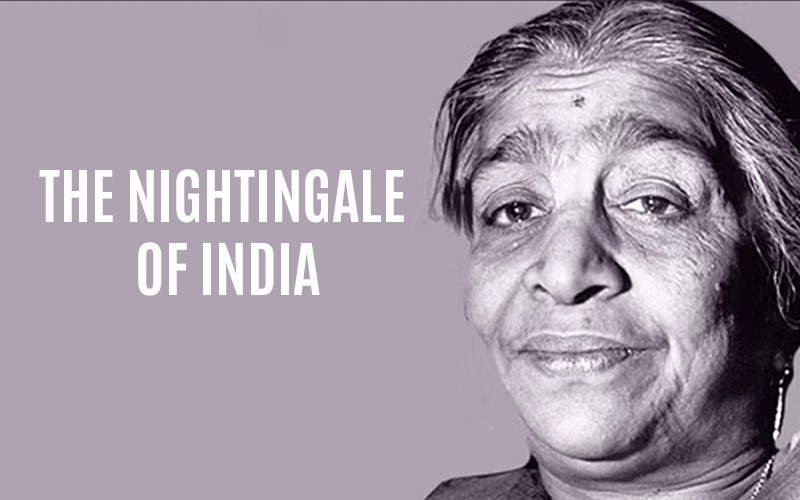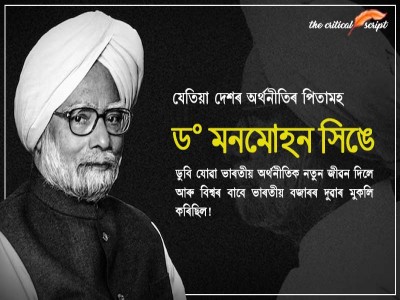
The Nightingale Of India
Sarojini Naidu
was not only the bravest Indian who fought for freedom from the British but
also a champion social activist. Sarojini was a great poet, an advocate for
women’s rights, an outspoken voice of reason and humanism, and a loving
daughter, wife, and mother. She combined many activities with cheerful energy
and was way ahead of her time.
Sarojini Naidu was born on February 13, 1879. Her father Aghoranath Chattopadhyaya was a scientist and philosopher and the founder of the Nizam College, Hyderabad. Sarojini Naidu's mother Barada Sundari Devi was a poetess and used to write poetry in Bengali. Being influenced by her mother Sarojini started composing poetry at an early age and is popularly known as the ‘Nightingale of India’ for her ingenious, idealistic and mystical poems. At the age of twelve, Sarojini Naidu attained national fame when she topped the matriculation examination at Madras University. Her father wanted her to become a mathematician or scientist but Sarojini Naidu was interested in poetry. She started writing poems in English. Impressed by her poetry, the Nizam of Hyderabad, gave her a scholarship to study abroad. At the age of 16, she traveled to England to study first at King's College London and later at Girton College, Cambridge. There she met famous laureates of her time such as Arthur Simon and Edmond Gausse. It was Gausse who convinced Sarojini to stick to Indian themes such as India's great mountains, rivers, temples, and social milieu, to express her poetry. She depicted contemporary Indian life and events. Her collections "The golden threshold (1905)", "The bird of time (1912)", and "The broken wing (1912)" attracted huge Indian and English readerships.
The Freedom Struggle
A poet can never stay away from the
relevance of society, while continuously writing poetry, starting in 1904,
Sarojini also became involved in the freedom movement. In addition, she was a great
orator and was asked to speak at many gatherings, including at the Indian
National Congress in 1906. She came into contact with Gopal Krishna Gokhale,
Rabindranath Tagore, Muhammad Ali Jinnah, Annie Besant, C.P.Rama Swami Iyer,
Gandhiji, and Jawaharlal Nehru.
Sarojini was greatly influenced by
Mahatma Gandhi, with who she forged a close partnership in the freedom
movement. While a firm believer in Mahatma Gandhi’s Non Violent struggle, she
also stood up to him on some issues. In particular, she influenced Mahatma
Gandhi to change his views on the participation of women in the freedom
struggle.
When Mahatma Gandhi began his Salt
March in 1930, he did not want women to participate. However, Sarojini was part
of a small group of women who persuaded him that they could do as much as the
men. Mahatma Gandhi agreed and found Sarojini so effective that he made
Sarojini the new leader of the Salt March when he was arrested.
Sarojini became the first woman
president of the Indian National Congress, founded the All India Women’s
Conference, and contributed tremendously to India’s freedom.
The poet-politician wrote a biography
of Muhammad Ali Jinnah entitled The Ambassador of Hindu-Muslim Unity.
Sarojini became India’s first woman governor (of Uttar Pradesh) in 1947 but died on March 2 1949 at the age of 70.
A Poet
Through all her public work, Sarojini
remained creatively involved as a poet. She wrote for a wide audience and on
many themes, serious and playful. One of her best poems was dedicated to India
and titled “Awake.” The poem applies as much today as when it was written in
1917. In it, she urges the people of India to "awake" to their
destiny and to work for harmony and peace for all.
“Waken, O mother! thy children implore
thee,
Who kneel in thy presence to serve and
adore thee!
The night is aflush with a dream of the
morrow,
Why still dost thou sleep in thy
bondage of sorrow?
Awaken and sever the woes that enthrall
us,
And hallow our hands for the triumphs
that call us!”
(Source: Collected)
Disclaimer: The opinions expressed in this article are those of the author's. They do not purport to reflect the opinions or views of The Critical Script or its editor.

Newsletter!!!
Subscribe to our weekly Newsletter and stay tuned.
















Related Comments